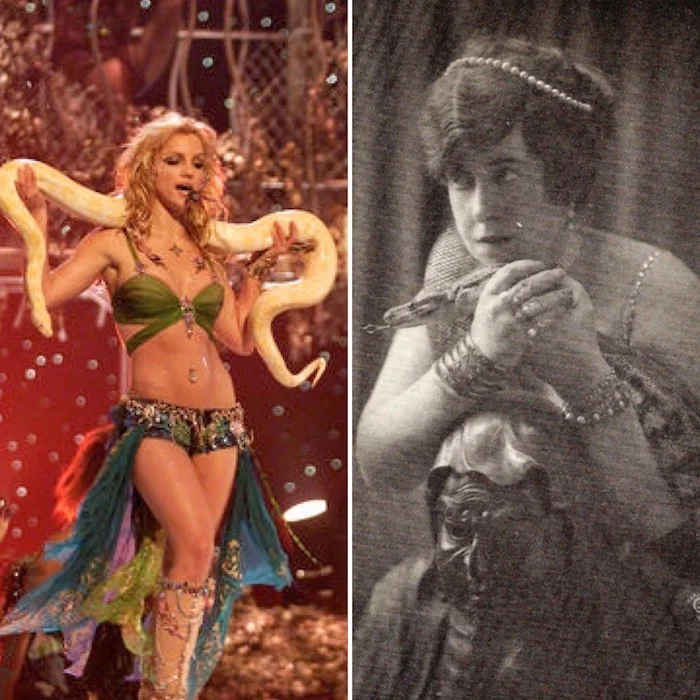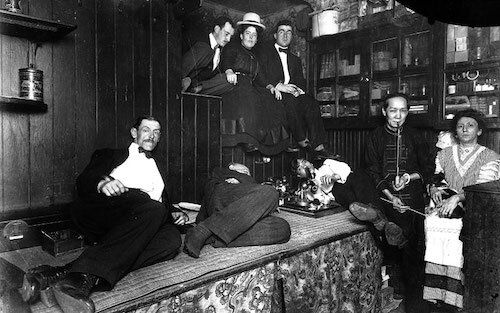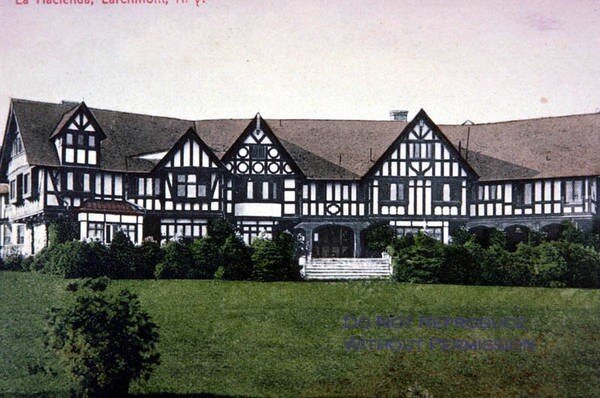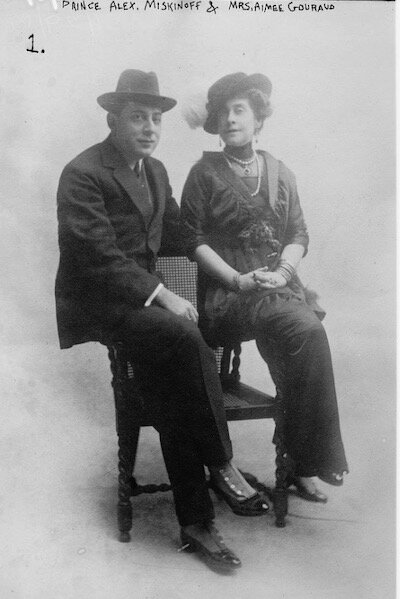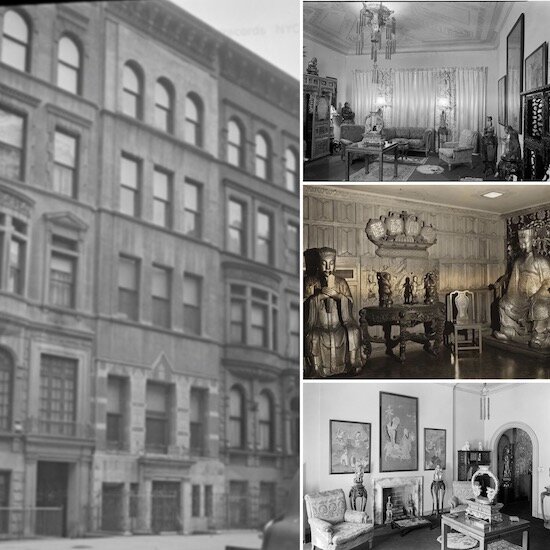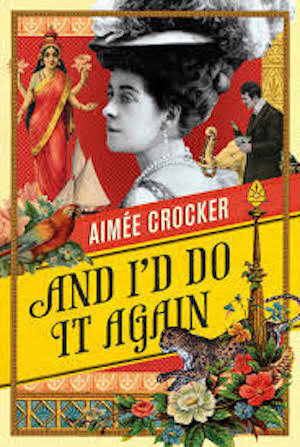Long Before Britney, There was Aimée
The sight of two celebrities with snakes on the 2019 MTV Music Award red carpet earlier this year had the press waxing nostalgically for Britney Spears, who donned a yellow python eighteen years before at the 2001 VMA Awards, proclaiming her originality.
Britney however, was by no means the first woman to cause a sensation by accessorizing herself with a snake. Nearly a hundred years earlier, Aimée Crocker made headlines nationwide when she appeared at social events with Ka,her twelve-foot long boa constrictor draped about her.
While perhaps not as well known today as other gilded age heiresses, Aimée, was one of the most enduring “celebutantes” of her day. Dubbed “the Queen of Bohemia” and “The Most Fascinating Woman of Her Age “ by the press, this oft-married, wealthy libertine who collected lovers, jewels, and adventures with equal abandon knew how to wield the power of publicity, holding the public in her thrall for five decades, blazing a trail for later heiresses, from Brenda Frazier through Paris Hilton, to follow.
Amy (as her name was originally spelled) Isabella Crocker was born on December 5, 1864 ,in Sacramento, California, the daughter of Judge Edwin B. Crocker and his wife, the former Margaret Rhodes.
Edwin was the brother of Charles Crocker, one of the Central Pacific’s legendary “Big Four”. An active player and major shareholder in the Railroad, Edwin left an estate estimated at $60 million when he died in 1875. Half went to Margaret while the rest was split between his three daughters. Worth roughly $10 million, Amy was a major heiress at age eleven.
In 1877 she was sent to Dresden Germany along with the daughters of five other similarly wealthy west coast families for “finishing” under the chaperonage of a respectable San Franciscan widow named Mrs. Burridge.
A scene of Dresden in the 1880s
While only fourteen and technically too young, Amy was formally presented at Court, where she met Prince Alexander of Saxe Weimar, with whom she had her first flirtation and a brief engagement. Around the same time the upright Mrs. Burridge vanished, leaving her charges alone in a rented mansion with no money. After enjoying their freedom for a brief time, the girls cabled their families and several worried mothers were soon on steamships bound for Europe to rescue the young ladies.
Margaret Crocker enjoyed travel, and after rushing thousands of miles to come get her daughter, she was not about to rush back home without enjoying a few leisurely stops on the Continent first.
Margaret Rhodes Crocker
The two went to Madrid where Amy (who had jettisoned her Prince before her mother’s arrival in Dresden), promptly fell under the charms of a toreador. Margaret put a stop to the romance, taking her 15-year old daughter to London. It was there Amy first made the acquaintance of David Kalakaua, also known as King Kaulakoa of the Hawaiian Islands, who would eventually play a role in Amy’s future.
David, King Kaulakoa of the Hawaiin Islands
Back home, Amy managed to stay out of the press until 1882, when she eloped with Porter Ashe, the scion of a prominent San Francisco family. Their disapproving families discovered the marriage three weeks after the fact, when the news appeared in the gossip columns. All was forgiven however, after she and her husband survived a deadly train crash on their honeymoon, catapulting them out of the local gossip columns and onto the front pages of the nation’s papers.
Magazine illustration of the tehachapi train disaster that Amy and her husband survived.
Margaret gifted the newlyweds an elaborate mansion on Nob Hill, hoping Amy would settle into the life of a young society matron. That was not to be.
Amy (center) entertained luminaries such as Lily Langtry and Oscar Wilde at her lavish Nob hill Mansion (above left)
The young couple entertained the cities bohemian set with wild parties and hosted famous celebrities visiting San Francisco, including Lily Langtry and Oscar Wilde. The marriage crumbled and the couple separated in 1886. Despite Porter’s reputation as a profligate gambler, and his kidnapping of their infant daughter Gladys during the divorce proceedings, he was awarded custody of her.
Wanting to get away, Amy chartered a boat and set sail for the Far East. Her first stop was Hawaii where she received as a guest of King Kalalaua, who made her a princess (Princess Palaikalani, meaning Bliss of Heaven), and granted her an island with 300 subjects to “rule” over.
King Kalākaua on the steps of the Iolani Palace in Hawaii
While in Hawaii she visited the leper colony on Molokai and became friendly with Washington Irving Bishop, a famed nineteenth century mentalist. Wherever she traveled, Aimee immersed herself in the local culture, and sought out new (sometimes dangerous) experiences.
The press didn’t quite understand Amy’s penchant for adopting local dress wherever she traveled.
Over the next several years she traveled on to Tahiti, Japan, Hong Kong, India and other Eastern destinations. Eschewing the uptight morals of westerners, she racked up adventures, including a brief time as the mistress of a Shanghai warlord, three weeks in a harem, narrowly escaping from a tribe of Borneo headhunters after taking up with their Prince, and avoiding a murder attempt by the knife-throwing servants of one of her paramours.
A street scene in Shanghai circa the time Amy spent there as the mistress of a warlord .
It was in the Far East the press claimed she secretly married her second husband, Henry Mansfield Gillig, yachtsman, amateur opera singer and a slight of hand artist. They denied the reports, and were legally wed in New York City 1889, with a small ceremony attended by family. The Giilligs settled there in a townhouse at 439 Madison Avenue and a large waterfront estate in Larchmont, New York, where Henry was Commodore of the Yacht Club and Amy raised prize-winning French bulldogs.
Amy with one of her prize-winning bulldogs
The marriage lasted for a decade (her longest). When the Gilligs divorced in 1900, Amy’s next husband, Jackson Gouraud, was waiting in the wings. A decade younger than Amy, they had initially met at the Buddhist colony she had organized at her Madison Avenue townhouse. A popular ragtime songwriter, he was perfectly suited to Amy’s unconventional lifestyle.
The Waldorf “hyphen” Astoria was one of Jackson’s most popular tunes
The couple got tattoos of coiling snakes bearing each others initials on their arms, attended the opening night of every new Broadway play, and went on “slumming” tours of seedy lower Manhattan neighborhoods, accompanied by Chuck Connors, a Tammany Hall operator who reputedly ruled Chinatown’s underworld.
Chinatown Opium Dens were very popular stops on Manhattan “slumming tours”
The couple also adopted two children, a boy and a girl named Reginald and Yvonne.
Amy with her adopted children
Around the same time Crocker was reunited with Gladys, her fifteen year-old daughter from her first marriage. Two years later Gladys married Gouraud's younger brother Powers, making her Amy’s sister-in-as well. As if all this and being a practicing Buddhist weren’t enough fodder for the press, a fire that consumed her Larchmont mansion (undeterred, Amy built a larger one to replace it), and the mysterious poisoning of some of her prize-winning bulldogs kept her in the headlines.
The “new” La Hacienda in Larchmont, which Amy had built after the original burned to the ground.
Amy’s enlarged family moved between San Francisco, Paris and New York. In 1903 Amy purchased a new townhouse there, at 46 West 56th street.
It was also the scene of some of Amy’s legendary entertainments, which she liked to throw wherever she was. Mixing together the famous and infamous, they were events where politicians, maharajas, and literary figures could rub shoulders with opera singers, Broadway showgirls and Bowery Boys.
Amy (seated center with star in her hair) and some guests at one of her costume parties
One of her most famous perhaps, was her “Dance of all Nations” party, which featured performances of a “Salome” dance, the “Vienna Viggle” and a “cannibal” who danced wearing little more than coconut oil and a red sash. Crocker, swathed in pearls “that would clothe a baby and ransom a king,” first danced an Argentine Tango (considered practically obscene at that time) before returning later with a twelve-foot snake twined round her to perform “ La Danse de Cobra”. When guests backed away from the snake's darting tongue she admonished, “It's as gentle as a powder puff."
It didn’t require a snake to keep one group away from her parties. Her courting of the press, public embracing of Buddhism, democratic attraction to interesting people from all walks of life, and perhaps worst of all, marrying a showman, was simply too much for stiff-necked blueblood Social-register types, including some of her own relations. It didn’t bother Amy one bit. If “high society” snubbed her, the press fawned over her and an eager public followed her every move. In 1910, Amy published a book of reminiscences titled “Moonlit Madness”, in which she recounted some of her adventures.
That same year Gouraud died of tonsillitis. Bereft, Amy moved to Paris with her children, changed the spelling of her name from “Amy” to “Aimée, and put her West 56th house on the market. Four years later, she married again in London, to a Russian Prince named Alexander Miskinoff.
The marriage, which only for lasted for two tempestuous years , included very public speculations of him having an affair with Crocker's 15-year-old adopted daughter and Aimee bearing a baby of his in secret, whom she sent away when the child was a month old.
She returned to her Paris mansion at 4 Rue Alfred dehodnecq (christened “the House of Fantasy” by the press) after World War I, resuming her splendid entertainments and housing young artists and exiled Russian nobles there. She later lived at the Hotel Biron as part of an artists colony that included Matisse, Rodin, Isadora Duncan and Jean Cocteau.
Hotel Biron, Paris
Aimée continued to be romantically linked to many high-profile men, including famous musicians, socialites, diplomats, and actors.
In 1925, Aimée married for her last time at age 61 to another Russian Prince named Mstislav Galitzine, who was twenty six years old. When asked by a friend if he was her fifth or sixth husband, she repled, “The prince is my twelfth husband if I include in my matrimonial list seven Oriental husbands, not registered under the laws of the Occident.” Although this marriage proved as short lasting as her previous one, she kept her title Princess Galitzine for the rest of her life.
She later moved back to New York, taking a townhouse at 19 East 92nd street, filling with her collection of Eastern Art and artifacts
If her activities mellowed a bit as she aged, In 1936 Crocker published a new memoir, And I'd Do It Again,
which included reminiscences of erotic encounters with a boa constrictor and a violin, shocking a new generation.
Aimee Crocker Ashe Gillig Gouraud Miskinoff Galitzine died on February 7, 1941, at age 78 in her apartment at New York’s Savoy Plaza Hotel. Newspapers around the country paid due homage to the “Queen of Bohemia”. Then it seems, she was simply forgotten. Relatively recently however, there has been a resurged interest and appreciation for this unique woman, who was ahead of her time in so many respects. Thank God (or, Buddha)!
For more information on this fascinating woman. Aimee Crocker’s memoir as well as other books about her are readily available and there is a website run by her official biographer. I understand there is also some kind of movie in the works about her. I wonder who they will cast to wear the snake?

